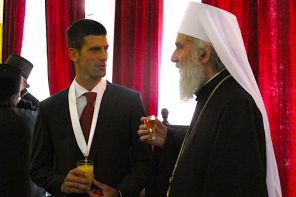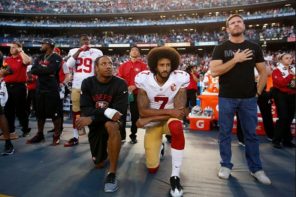I wept on Friday evening when I heard the news of the death of Coach John Wooden. I had seen him the day before at UCLA looking frail and tired after 99 good years—as long and rewarding a life as one could hope. Coach Wooden was ready for a good death, surrounded by family and friends, knowing that he would soon meet his beloved Nellie again, who had passed on some 25 years earlier. But the tears in my eyes were not for Coach; in losing him, we lost not just one of the great American men of the last century—one of our greatest teachers—but someone who transcended our differences and cared for everyone.
There are many dichotomies we are fond of dividing America into: black and white, rich and poor, native and immigrant, gay and straight, urban and rural, and however else you draw your lines. Coach Wooden transcended many of those simple dichotomies, offering wisdom accessible to almost anyone. He was born in Hall, Indiana, four years before the Great War, later moving to the “big” town of Martinsville, population 4,800. So Coach knew the rural life.
In 1948 he moved to Los Angeles where he would live for the rest of his life. As a part of the great migration from the rural Midwest to the urban West, he could sympathize with both urban and rural concerns. Basketball, of course, was common to both, played with equal fervor by farm boys in Indiana and gang bangers in South Central. And not only did he survive in the wilds of Los Angeles, he thrived, voted by the Sporting News in 2009 as the greatest coach of all time.
As a young Muslim kid growing up in Toronto in the 1970s, I had very few Muslim role models. One of them was Kareem Abdul-Jabbar, Coach Wooden’s 7-foot-2-inch center at UCLA. In learning more about Kareem (born Lew Alcindor), I came to appreciate the influence that Coach Wooden had had on him during the racially and politically charged period of the late 1960s. I wrote to Coach Wooden as an undergraduate asking for a copy of his famous Pyramid of Success. About a month later I received an autographed copy, along with a nice note. That in turn led me to his textbook, Practical Modern Basketball, first published in 1966, which helped me to work on my game. I was the nerdy kid in high school, not becoming a jock until university. There, I developed and flourished as an athlete. To this day, one of the awards of which I am most proud was when I graduated from University College in 1987 as the best male athlete. As I tell my students at LMU, I don’t look like much now, being old and slow and fat, but I used to be somebody.
When I moved to the San Fernando Valley in 1997 to start teaching at Cal State Northridge, I sought out Coach Wooden. That was another of the amazing things about him. He was approachable, answering his own phone and mail, meeting with complete nobodies like me. I thanked him for the basketball lessons that I had learned from him, but more importantly for the life lessons. His beloved wife Nellie had passed away in 1985 after 53 years of marriage, and my wife had died suddenly in 1992. Coach gave me a powerful model for dealing with that loss, a reminder that those we loved were always in our lives. On the 21st of each month (Nellie had passed on March 21), Coach would write a letter to Nellie, adding it to the neat pile on her side of the bed.
During my development as a teacher, I came to realize even more powerfully the skills that Coach Wooden had, and tried to incorporate his ideas into my pedagogy. He was also a man of deep faith, though he didn’t wear his religion on his sleeve. None of the fifteen blocks of the Pyramid of Success, for example, are about religion; the mortar was patience and faith (“through prayer,” as he wrote). Family, faith, and friends were the three most important things to him.
He never imposed his Christian faith on anyone, only insisting that his players “have a religion and believe in it.” Coach was a pluralist long before many of us had heard of the term. Of his own faith, one of his favorite maxims was “If I were ever prosecuted for my religion, I truly hope there would be enough evidence to convict me.” Many of us have grown tired of the hypocrisy of self-described “Christian athletes” who can glibly quote Bible verses but can’t manage to live by them. Coach, as always, was different. We both agreed that Abraham Lincoln was the greatest American, but he said that the greatest person of his generation was Mother Teresa. Like her, he lived out his Christianity in service to others.
In 2005, I moved from a secular religious studies department at Cal State Northridge to a department of theological studies at Loyola Marymount University. One of the first theological pieces I wrote, on “Theology and the Intellectual Life,” I dedicated to Coach Wooden, who I thought was underappreciated for the theological reflection that was his life.
For a man who was the best there ever was at what he did, he still didn’t care about winning and losing. A teacher at heart, he cared about his players not so much as athletes, but as students with promise and potential. That’s something that fits in perfectly with the Jesuit and Marymount traditions of LMU, what we call cura personalis, or the care of the whole person. What we do as teachers is a sacred trust, and Coach Wooden did it better than any of us. He didn’t like being called “the Wizard of Westwood,” and he would have hated to be called a saint, so let us call him what he was, simply and with great pride: a teacher. And let us thank God for the life and teachings of John Wooden.




